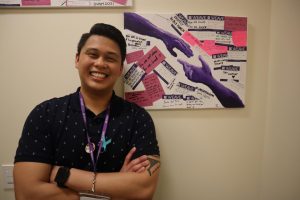FAQ: WEAVE and Office of Equal Opportunity, what’s the difference?
What the two sexual assault resources at Sac State offer to students, faculty
Jamie Gerigk stands in front of WEAVE in Downtown Sacramento Thursday, Nov. 10 2022. Gerigk is the Master of Social Work and Chief Program Officer for the non-profit organization at Sacramento State and says the organization’s services are offered to all students and faculty.
November 16, 2022
After the recent string of sexual assaults against Sacramento State students, The State Hornet compiled this FAQ with information from WEAVE employees and the Office of Equal Opportunity to answer what the two campus resources offer students and faculty.
WEAVE
Q: What is WEAVE?
A: WEAVE (When Everyone Acts Violence Ends) is a nonprofit organization that provides free crisis intervention services for sexual assault, sexual harassment, sex trafficking, stalking and/or intimate partner violence survivors.
Sacramento State partnered with WEAVE in 2020 to provide a confidential advocate on campus to support survivors and provide prevention education, according to WEAVE’s chief program officer for counseling and outreach, Jaime Gerigk.
Q: What services does WEAVE offer?
A: Through WEAVE, Sac State’s confidential campus advocate, Laura Swartzen, is available to review survivor’s rights and options including confidential counseling, safe housing support, reporting options, advocacy and accompaniment.
“We have an incredible legal team that offers support around filing a restraining order, working through child custody, divorce, anything like that that they may need,” Swartzen said. “Our services don’t just support survivors, but [also] the support group that survivors have.”
Q: Who can use WEAVE’s resources?
A: At the Sacramento State office, resources are available to all students and faculty, whether the incident happened on or off campus, according to Gerigk. They are available for survivors of past or present assaults.
“Somebody can experience something two minutes ago or 20 years ago,” Swartzen said. “There’s no time frame in which someone can come and access care and resources and be met with an abundant amount of support.”
Q: Where is WEAVE located?
A: On campus, the office is located inside The WELL.
WEAVE’s youth advocate, Leander Loh, said that if students or faculty feel more comfortable, they can make an appointment at the organization’s midtown location on 1900 K St. and receive the same free resources.
Q: How do I contact the WEAVE office?
A: Sac State students and faculty seeking WEAVE’s resources can email the office at [email protected] or call (916) 278-5850 Monday through Friday.
For after-hours and weekend support, WEAVE has a 24-hour support hotline that survivors can call. The number is (916) 920-2952.
Title IX and the Office of Equal Opportunity
Q: What is Title IX?
A: Title IX is a federal law that mandates all college campuses to address discrimination and harassment based on sex.
“Where that comes into play is if a student experiences sexual assault by another student on campus, Title IX can provide another layer of protective measures — removing that perpetrator from classrooms, providing safety measures and no contact orders,” Swartzen said. “[Also] making sure [the survivor] maybe receives some academic support accommodations while they’re ongoing an investigation against that other student.”
Q: What does the Office of Equal Opportunity do?
A: The OEO addresses reports of discrimination issues including sexual harassment, sexual misconduct, dating/domestic violence stalking and/or related retaliation, according to Vice President of Inclusive Excellence Dr. Mia Settles-Tidwell.
Q: How do I report an incident that falls under Title IX to OEO?
A: Students who have experienced sexual discrimination or harassment can fill out an online complaint form.
Sac State employees and those with third-party information about an incident that occurred on campus can fill out a separate online form.
Q: What happens after I file a report?
A: According to the office, a determination on whether a report leads to a formal process is made by the OEO based on factors including whether the complaint falls under Title IX, the wishes of the complainant and whether the incident presents potential safety concerns for the campus.
If the complaint does lead to a formal process, an investigation or, alternatively, an early/informal resolution will follow. A live hearing may also follow the investigation.
Q: What’s the difference between WEAVE and OEO?
A: WEAVE is a support organization for students and faculty while the OEO also offers support and handles Title IX reports.
Q: How do WEAVE and Title IX relate to each other?
A: As the confidential campus advocate, Swartzen can accompany survivors to file a Title IX report.
“The investigator at Title IX is really good at checking in [to ask if survivors need a break from the interview],” Swartzen said. “[They’ll ask] ‘What other support can I offer you right now? Do you need to go in the breakout room with Laura?’”
Additional reporting by Gavin Hudson.




































































































































